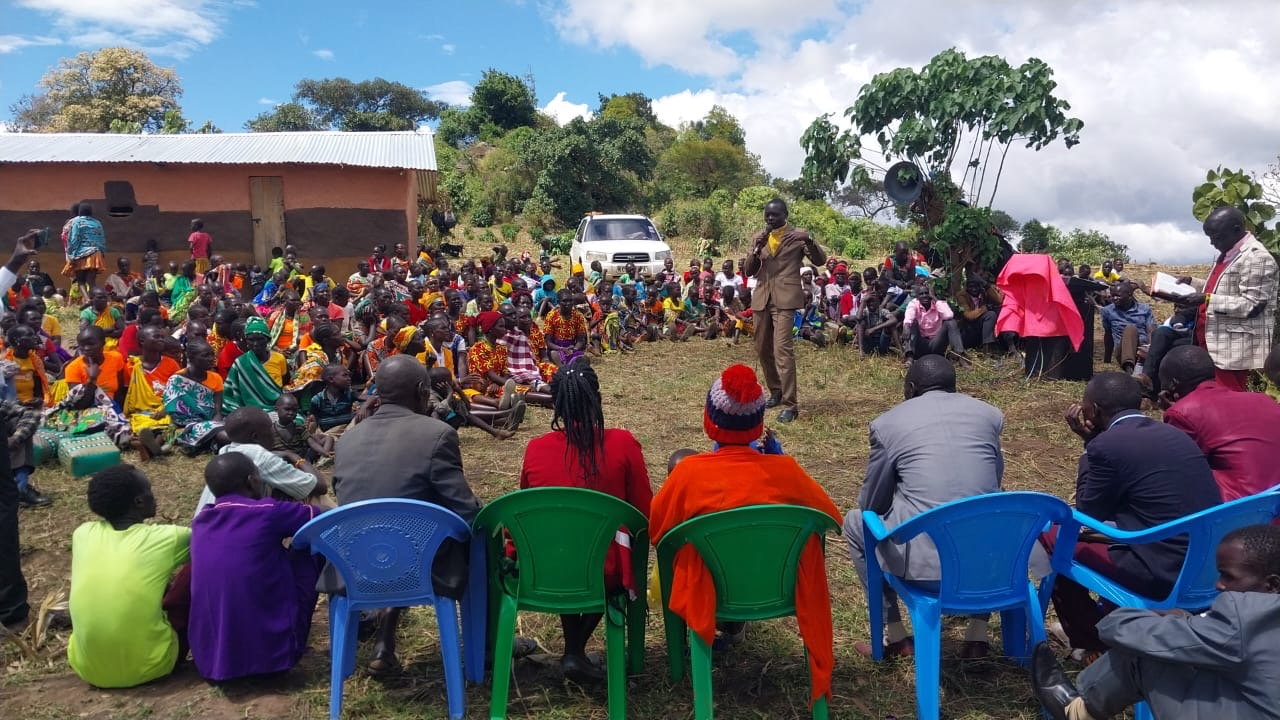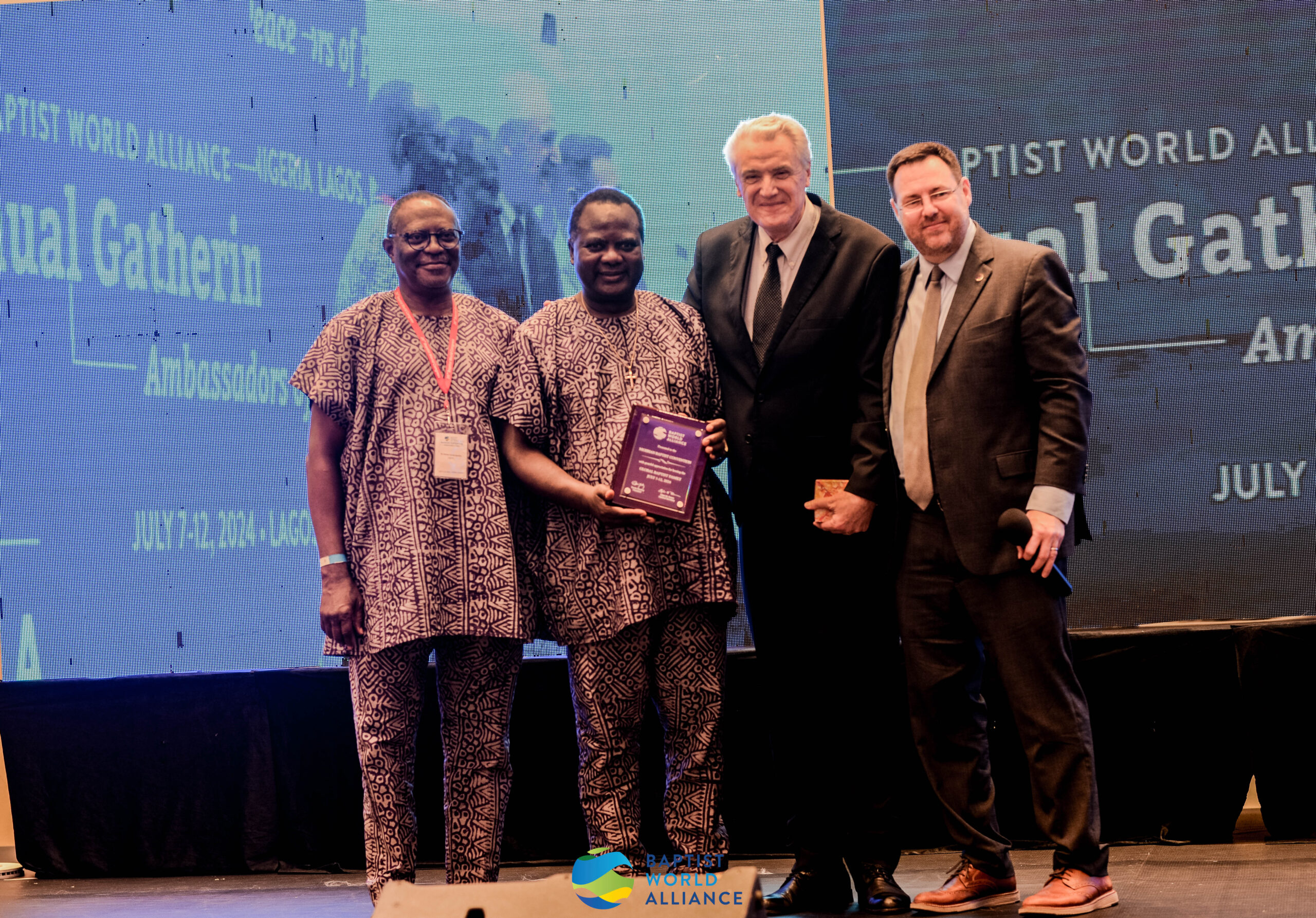Commentary: Resisting Christian nationalism and Project 2025
(RNS)—In late 2023, Christopher Tackett posted a video on X (formerly Twitter) of a clip from the Heritage Foundation Leadership Summit.
Describing the video, he wrote: “The Heritage Foundation and a ton of other ‘conservative’ organizations created Project 2025. They want to dismantle democracy.”
The post came at the end of a lengthy thread in which Tackett attempted to share the pieces of a puzzle he and his wife, Mendi, had spent the past few years putting together.
The Tacketts are not politicians or journalists. They are a middle-aged couple who moved back to the small Texas community where they both were raised to raise their own children and found it had changed. Everywhere they turned, they saw an insidious influence they could not name.
They started following the money swaying their local politics and investigating what they found. As the full picture of what was happening emerged, they were able to assign a name to that insidious influence: Christian nationalism.
In recent years, scholars and journalists have coalesced around the term “Christian nationalism” to describe a nostalgic mythology that has taken hold on the American right. In the myth, conservative white Christian America—the “true” America—is under assault by a secular and multiculturalist left intent to destroy it.
Donald Trump’s slogan “Make America Great Again” was a call to restore this mythologized “true” America, which rests on a social order in which conservative white Christian men have dominion over all others, including women, nonwhite Americans and non-Christians.
In this society, white Christian men ought to be afforded maximum freedom (including from government), while others must be controlled (with the government’s assistance).
Advance of Christian nationalism
Understanding this worldview helped the Tacketts connect dots between the fights they saw fracturing their small Texas community and, increasingly, the entire country.
They created a website—“See It. Name It. Fight It.”—to educate others about Christian nationalism, how to identify its influence in their communities and how to fight back against it. Today, they have more than 20,000 followers on X.
They have repeatedly cited Project 2025 as an example of how national leaders are working to push a Christian nationalist agenda. As the hidden-camera video of Russell Vought revealed recently, this is precisely how Project 2025’s authors thought of it, too. The goal, in Vought’s own words, is to “get us off multiculturalism” and promote “Christian nation-ism.”
Though Project 2025 would not become a household name until mid-2024, many of its early critics were people like the Tacketts, who immediately recognized Project 2025 as a detailed blueprint for building the Christian nationalist society they were warning people about.
In the 2023 Twitter thread in which Tackett warned his followers about Project 2025, he concluded: “I’m sure in your community, the same things are happening. Christian nationalism is attempting to grab all levers of power. It’s up to us to stop it #SINIFI.”
Opposition to Christian nationalism
For the past year, I have been following and talking to people, like the Tacketts, who are working to educate others about the dangers posed by Christian nationalism.
Though it is difficult to measure how many individuals are involved in these resistance efforts, a recent survey by PRRI finds 30 percent of Americans wholly reject the ideas associated with Christian nationalism, and another 37 percent are skeptical.
With new campaigns to resist Christian nationalism continually emerging, it is clear many of those concerned individuals have joined organized efforts to fight back.
Those involved range from concerned citizens to scholars and journalists to people who lead organizations and campaigns devoting significant resources to resisting Christian nationalism.
Some speak and write publicly about what they learn in order to inform others. Some work more quietly to confront extremism and hate within their community or family. Some people join reading groups at their church.
Others attend seminars and gatherings hosted by local faith-based community organizing networks like Gamaliel or view webinars through organizations like Vote Common Good, Christians Against Christian Nationalism or the After Party.
Some mobilize politically. The Tacketts’ strategy of “See It. Name It. Fight It.” generally captures this wide range of activities.
Opposing Project 2025
When Project 2025 was released, it was the perfect test of this emerging movement’s capacity to see it, name it and fight it. And they did.
Last September, Guthrie Graves-Fitzsimmons of the Baptist Joint Committee for Religious Freedom, which leads the Christians Against Christian Nationalism campaign, published an MSNBC op-ed laying out Project 2025’s “underscrutinized” “theocratic elements.”
Soon after, the Global Project Against Hate and Extremism released a dense report on Project 2025 that included an entire section on “The Role of Christian Nationalism.”
In a December email to supporters, Doug Pagitt of Vote Common Good called Project 2025 a “blueprint for Christian Nationalism.”
In an early 2024 article in Salon, Andra Watkins, who describes herself as a “product of Christian Nationalism,” uses her insider knowledge to show Project 2025 is a “Christian Nationalist manifesto”—a topic to which she since has devoted an entire Substack newsletter.
Also at Salon, the Rev. Liz Theoharis of the Kairos Center and the Poor People’s Campaign writes of Project 2025, “the wholesale capture of the state is the ultimate goal of its Christian nationalist architects.”
Historians Kristin Du Mez, Jemar Tisby and Diana Butler Bass dedicated an entire webinar to Project 2025, which was covered by Baptist News Global with the headline “Scholars Warn: Project 2025 is a Christian Nationalist Blueprint.” Each individually had been sounding the alarm about Project 2025 for months.
Americans United for Separation of Church and State’s “Project 2025: The Christian Nationalist plan to take over America,” the Secular Coalition for America’s list of “Top Ten Project 2025 Attacks on Church State Separation” and others also critique Project 2025.
This sampling of the statements critiquing Project 2025 helps us to see the field of resistance to Christian nationalism in action.
A prepared resistance
This resistance movement did not emerge out of thin air. Resisters were only able to mobilize quickly and draw attention to the Christian nationalist impulses at the heart of Project 2025 because they had spent the previous several years seeing, naming and fighting Christian nationalism in various guises.
This work prepared them to make a swift and targeted rebuttal of Project 2025. It also appears to be preparing them for the long road of resisting Christian nationalism and promoting a pluralistic democracy that will extend far beyond the 2024 election.
Ruth Braunstein is an associate professor of sociology at the University of Connecticut and the director of the Meanings of Democracy Lab. This opinion article has been edited for length. The views expressed in this article are those of the author.






